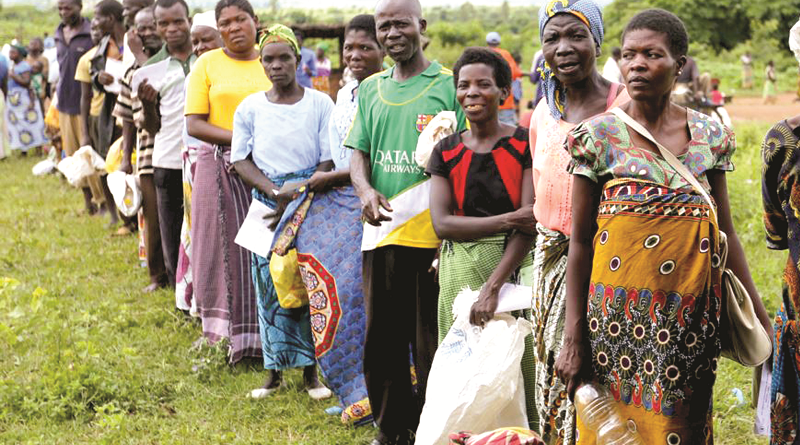Malawi: a society without order
By Eugenio Njoloma
In 2014, a young musician under the nickname of Lawi produced a song that enjoyed massive airplay. He called it Amaona Kuchedwa. The studio work was admirable. But it was the message in it that resuscitated people’s consciousness about the need to exercise patience when doing certain things.
Patience goes hand in hand with continence. The absence of it has, however, landed so many people in trouble. Others have failed to conquer surmountable libido ignited by involuntary movement of a woman’s buttocks, others seem to possess enduring appetite for fast foods like Kanyenya, and others cannot spend a day or two without a bottle of beer. But in all these, mapeto ake ndi Ngozi!
This lack of patience is an important indicator of intrinsic deficiency of order in not just a human person but in Malawians. The syndrome keeps on seeping through to the society. Or perhaps, it could be the other way round. But whichever way, the result is the glaring dearth of order in this society.
Travelling between the country’s three bigger cities by public transport is a nuisance. When at Wenela in Blantyre, or Lilongwe or Mzuzu bus depots, one has to endure over five hours before the bus starts off. Over 10 buses going to one destination rev engines at the same time. They are all filling up passengers simultaneously. There is no order.
Does anyone up there, particularly those in policy-making circles, ever think about the cost of this? A whole day is wasted just to cover a distance of less than 400 kilometres either way from Mzuzu or Blantyre to Lilongwe. This simply means businesses lost, office hours lost, a job lost, an appointment with a medical specialist lost, and, who knows, a life lost.
Recently, government has suspended an exercise that required every phone user to register their telephone number or numbers. It is a commendable exercise, yes, because it will help to curb certain criminal acts. It is basically the emulation of South Africa’s Regulation of Interception of Communications and Provision of Communication-Related Information Act (RICA). It is a good thing.
Yet the way it has been administered leaves a lot to be desired. why should it involve taking a picture of a person’s particulars from their physical identity document? What if the available document lacks clarity of the holder’s face due to damage simply from a photographical failure?
But again, was it not just recently that the National Registration Bureau coaxed the entire nation to queue for national registration? Where did it get the directive? Was it not from the same government that has also ordered the registration of telephone numbers? Or is this a new policy altogether that arose in some politician’s mind the night before its announcement?
It does not stop to get surprising. So many people are registered on Mpamba of TNM and Airtel Money of Airtel. These also happen to be the mostly used service providers in the country. Unless otherwise, most people used valid identity documents to register for these mobile banking services. Did or does that mobile banking information go to a different data server? There is no order.
Well, why would one use a thumb at the Road Traffic Directorate, at MEC at the Immigration Office, at the Bank, at Police for the entry of new personal details? Why not link a person’s particulars onto a uniform server that would reveal a person’s details once the thumb is pressed? There is no order.
But there are important consequences of this lack of order to the Malawian nation. The most significant one includes the absence of a common national policy to guide every regime that comes to power. This explains why every regime hops like a headless chicken in pursuit of its own ‘development’ agenda.
In most cases, this agenda is informed by the candidate’s or their political party’s electoral manifesto. Yet it should have been a well-articulated national policy to inform lay basis for the electoral manifestos.
If it is not wasting nearly two successive days laying foundation stones for a similar project, then it is an inauguration ceremony of a certain substandard tarred road in Chiputula, Bangwe, or Manje. Others have distributed cows and handed-over tiny and toilet-looking like structures, which they have called houses. Nsambi!
How do Christians under the synods of Nkhoma and Livingstonia feel when their leaders get engrossed in enduring fights? Za ambuye zomwezi? It is asked in the bible: what do people gain when they win the whole world but lose their life? How would such a divided religious body proclaim national unity? Hypocrisy!
When Catholics sing “Akatolika ndiamodzi samalekana” they simply mean that Chikwawa, Blantyre, Zomba, Mangochi, Dedza, Lilongwe, Mzuzu, and Karonga dioceses are just administrative regions. A parishioner from Balaka can freely join the congregation in Mzambazi, Mzimba. This is the epitome of unity. This is what is known as order!
While the Reserve Bank of Malawi has commendably lowered lending rates, some banks remain reluctant to push down the interest rates. The country’s major banks want to reap more. They still steal more from the poor. But because this is a capitalist economy, government is paralyzed. There is nothing it can do to force the banks to respond positively.
The result is a stagnant economy where people cannot afford to borrow and invest. The same people with purchasing power would continue to traverse the banks because they would be able to repay the exorbitant bank fees. The lack of regard to the vulnerable signifies absence of order. The society is imperfect.
Every year, floods wreak havoc on people’s houses. It is just recently that Mzuzu and Lilongwe have become characteristically prone to flooding incidents. In primary Geography in those years, pupils learnt of Kasungu-Lilongwe plain.
In Chichewa, a plain was defined as “Malo a thya thya thya!” Thus, one would think that the area’s topography is favourable for housing. The biggest problem, however, is the construction of houses in streams. It is said “Madzi samayiwala khwawa.” As such, the water will follow its natural route. There is no order!
What are the departments of planning doing in these cities? Oh, they are heavily preoccupied in some clandestine business. They are no longer civil servants. They have become literally estate agents whose major interest at work is not to plan the cities anymore, but to think of which plot to sell and/or resell?
Yet being orderly would be very beneficial. In the first place, government would be able to prioritize relevant interventions. It would eschew from doing so many things at one. Paja zikachuluka sizidyeka. Because this country is very poor, that it would require really much effort and commitment, a quick fix would not work.
However, it would enable government to prioritize. It would pick one important intervention at a time and aim for its satisfaction. So, for example, it would devote five years to completing road networks. Then the next full five years would be used for revamping or improving the country’s health sector.
Agricultural production for food security would also be given five years. Then the energy sector can also be given its span. With the incessant blackouts, this would help in providing everlasting solutions unlike the adhoc interventions that will even haunt the country in near future.
There is need to accept that absolute development may not occur in this life time. Yet even if the country can develop long after this generation is gone, there shall still be smiles from the grave. But if not carefully handled, the next fifty years will see a more impoverished Malawi.
On the other hand, heaping all the blame on politicians may be misplaced. What these people do is only the appeal they make to the existing disorder and exploit it to their benefit. The best that can be done is to generate a shear sense of patriotism.
In homes, the children must be taught the significance of being orderly. They need to be told keep things neat and clean, to be correct in descriptions, and to avoid confusion. When they grow up with the spirit of orderliness, it will make politicians also appeal to this and perhaps start to do things straight.
Although still miles away in literary competence, I have tried to compose this piece in the same way Sam Mpasu delivered his messages, particularly in this very celebrated magazine. It is a way of writing that I enjoyed. Yet that skill is buried together with him. But he has left a good piece of talent worth emulating!
Similarly, I have tried to use the super intelligence of Bishop Emmanuel Kanyama in putting together the scattered pieces of my thoughts. A gentleman, so calm and intellectually gifted. He will be fondly missed. To you two, rest in peace my heroes!
Njoloma is a regular contributor to the Lamp. eugenionjoloma@yahoo.it.



21 thoughts on “Malawi: a society without order”